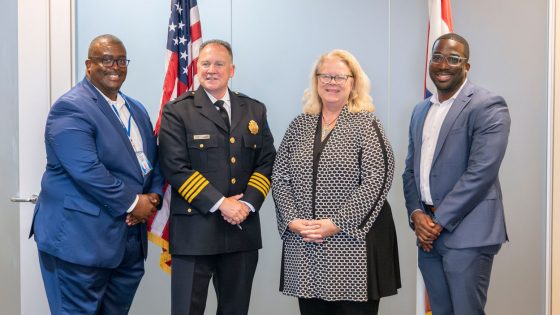
UMSL’s Advanced Workforce Center, which has opened a new location on campus, aims to be the leader in professional education in the St. Louis region for skilling, reskilling and upskilling. (Illustration by Martin Baragiola)
Stepping into a classroom for the first time in 13 years in January, Carmen Major felt immensely proud.
A police officer assigned to the body camera unit with the St. Louis Metropolitan Police Department, Major has worked for the department for nearly 20 years. She started working with the SLMPD in a civilian capacity in 2007, the same year she began studying at the University of Missouri–St. Louis after transferring from community college. But as a single parent with little support, she quickly got overwhelmed juggling her responsibilities at home, at work and in the classroom. She dropped out of school to focus on her career and providing for her family, going on to graduate from the Police Academy in 2019.
Last year, when Major heard about the SLMPD’s new educational partnership agreement with UMSL, she initially wasn’t interested. Even though the program, developed through UMSL’s Advanced Workforce Center, covers 100% of tuition costs after reimbursement, the idea of going back to school seemed unappealing. It reminded her of a time in her life when she had a lot of struggles.
But the more she thought about it, Major found herself getting excited about the possibility of being back in school and finally finishing her degree. While she wasn’t sure how she would perform, she knew she was older, wiser and better equipped to handle whatever life threw her way. She made the decision to dedicate her time and effort into being successful in school, enrolling in her first course in UMSL’s Department of Criminology and Criminal Justice this spring.

From left: St. Louis Metropolitan Police Department Academy Director Clarence Hines, Commissioner Robert Tracy, UMSL Chancellor Kristin Sobolik and Vice Chancellor for Strategic Enrollment and Career Advancement Reggie Hill met at the police department’s downtown headquarters in August 2024 to finalize the educational partnership agreement between UMSL and the SLMPD. The agreement supports commissioned officers in pursuing relevant degrees or certificates at UMSL. (Photo by Derik Holtmann)
Major says she’s been able to directly apply what she’s learning in the classroom into her work with the SLMPD. She’s especially enjoyed courses such as “Theories of Crime” and “Crime Prevention,” which helped her better understand why people commit crimes and how to stop them from doing so. After taking a course on statistical analysis, she’s able to interpret crime statistics in a more meaningful way, taking factors such as trends and policy into consideration. She believes that pursuing her degree at UMSL has made her a better police officer, and stresses that she would not have been able to finally earn her degree if not for the educational partnership agreement.
“There was little to zero barrier,” says Major, who will graduate with her bachelor’s degree in December. “Having the scholarship 100% cover the cost of my remaining classes was the catalyst in my return to school. It’s the reason I get to graduate in December, and the reason I get to show my son that his mother can do whatever she sets out to do. And it’s the reason that maybe I get to bring some inspiration to those around me. There is no word that is sufficient enough to describe my level of gratitude for this partnership.”
St. Louis Metropolitan Police Commissioner Robert Tracy says the department’s partnership with UMSL has created an environment where officers like Major feel supported in their long-term goals, both in policing and in their personal lives. The educational partnership agreement seeks to create pathways for the personal and professional development of officers, enhance their skills and strengthen the bond between higher education and public safety.
“Our department is committed to investing in our officers,” Tracy says. “Partnering with UMSL gives us the opportunity to ensure that every officer, regardless of rank or assignment, has access to affordable, high-quality education. UMSL has a strong tradition of preparing leaders in public service, and this partnership allows us to build on that tradition while directly supporting the professional growth of the brave men and women protecting and serving the City of St. Louis.”
The SLMPD is just one of several leading organizations – including Amazon, BJC Healthcare, Scale AI and World Wide Technology, among others – to launch educational partnership agreements with UMSL through the Advanced Workforce Center, which launched in 2023. While UMSL has been a leader in workforce development in the St. Louis region for over 60 years, the AWC is strengthening that commitment by providing a range of accessible opportunities for continuing professional education.
One major focus of the AWC is a customized corporate partnership model in which local companies invest in their employees by providing tuition breaks and prior learning credit for certifications, degree programs and noncredit coursework. Through these agreements, employees find intentional pathways to obtaining a certificate, bachelor’s or master’s degree, allowing them to build their own skills, meet company needs and increase the talent pool in the St. Louis region and beyond.
“Our goal is to be the leader in professional education in the St. Louis region as it relates to skilling, reskilling and upskilling,” says Reggie Hill, UMSL’s vice chancellor for strategic enrollment and career advancement. “UMSL is a leader in workforce education, whether that means taking an 18-year-old and putting them out in the workforce, educating an adult learner who’s thinking about a career change, or short-term, skill-based learning.”
Hill and Jamie Liston, UMSL’s executive director for career development and professional learning, have been working to forge collaborative agreements with a range of corporate partners with the goal of closing the educational gap and meeting workforce demands throughout the St. Louis region. Such partnerships are already having a lasting impact on employees, such as Major, who choose to take advantage of the opportunity to further their education.
Antoine Barnes, for instance, had never even heard of geospatial technology before he joined Scale AI in December 2020, having held jobs as a pharmacy technician, patient care technician and warehouse manager’s assistant at a local nonprofit. He started working at the company’s downtown St. Louis office as a data labeler and was then promoted to cleared Geospatial AI Trainer (Level 3), a role that involves identifying and labeling objects in Electro-Optical and Synthetic Aperture Radar images. As Barnes began working with satellite imagery and solving complex annotation problems, he developed a genuine interest in the technical challenges and problem-solving involved.
When he heard about the opportunity to pursue a Geographic Information Systems Certificate at UMSL through Scale AI’s new partnership with the university, he felt it would be a great way to advance his knowledge and skills in geospatial technology.
“With nearly five years of experience in geospatial data labeling, I see this program as a way to strengthen my technical expertise, bring fresh perspectives to my team and better contribute to Scale AI’s mission to accelerate the development of AI applications,” he says. “I expect to deepen my understanding of GIS fundamentals, including how geospatial data is stored, the different types of GIS systems and the relationships between points, polygons and other spatial elements. This knowledge will help me approach my work more confidently and collaborate more effectively with my team at Scale.”
The Advanced Workforce Center has been able to strengthen its educational partnership agreements with local companies such as Scale AI in part due to funding from the MoExcels Workforce Initiative, which has also allowed the center to grow its physical footprint on the UMSL campus. Last month, the Advanced Workforce Center opened in its new location in the J.C. Penney Building. The newly renovated 6,000-square-foot-space is home to two HyFlex classrooms for in-person and online learning and a testing center for individuals seeking licensing or certification for various careers, such as the Praxis exam for teacher licensure and certification.
The Advanced Workforce Center continues to build on the mission of UMSL’s Computer Education and Training Center, which was located in West St. Louis County, by offering fast, targeted training designed to support immediate skill development, from one-day workshops to multi-week courses. Professionals looking to enhance their skills can stay competitive in the job market through programming in data analytics, cloud-based collaboration, database and CRM administration, programming and AI tools or web management and digital marketing. While such programming has been available through the CETC for decades, Hill and Liston hope that even more UMSL students, faculty and staff members will take advantage of the Advanced Workforce Center’s industry-aligned training now that it’s conveniently located on campus.
“We know that our campus does an amazing job providing theoretical knowledge to our undergraduate students and degree programs,” Hill says. “But what if a student, prior to graduation, wants to be Power BI-certified because they’re going to work for a Fortune 500 company who utilizes Power BI? Our job is to ensure that not only our undergraduate students, but also our workforce learners, can be ready on day one.”
The MoExcels funding has also given the AWC the opportunity to partner with UMSL faculty on developing noncredit courses in areas such as chemistry, community and leadership and to strengthen relationships across campus to cross-promote the various noncredit certificates offered through different colleges and schools at UMSL.
Whether through degree or certificate programs or noncredit classes and continuing education, the Advanced Workforce Center is enhancing professional development and career readiness for both current students and corporate learners. And with its long history of catering to nontraditional students through flexible online programs and accommodating class schedules, UMSL is uniquely suited to meeting the needs of adult learners looking to diversify their skills.
“Our admissions staff, our academic advisors, they know how to help our students navigate these challenges,” Liston says. “The feedback we get from our learners is amazing. I recently talked to one of our partner students who has never been to college; he got a GED many, many years ago and never thought college was a possibility for him. Now, he’s starting his bachelor’s degree in cybersecurity remotely from Georgia through a partnership, and he could not be more thrilled and happy with the service that he’s received through our advising and admissions staff to this point. We’re opening doors that people thought were closed forever, which I think is really exciting.”
This story was originally published in the fall 2025 issue of UMSL Magazine. If you have a story idea for UMSL Magazine, email magazine@umsl.edu.














